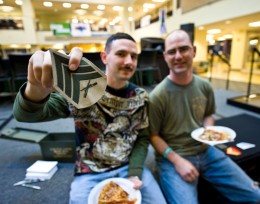
Wright State students and staff who are military veterans take part in a panel discussion at the Student Union as part of Veterans Appreciation Day. (L-to-R) Jared Shank, John Bowers, Joseph Gibbons, Jill Lindsey and Moneeka Gentry.
When Army veteran Jared Shank enrolled at Wright State University, he was fresh from a tour of duty in Afghanistan, a world of warfare where one hours-long firefight pumped so much adrenaline into Shank’s system that his face was soaked with tears.
Shank’s first weeks and months on campus were nerve-wracking as his conditioned reflexes struggled to adjust to the new tranquil environment.
He scrutinized everything for potential threats, avoided large crowds of students, was suspicious of unattended bookbags and even tried to avoid sitting with his back to the door when he was in class.
“In combat, you have a huge adrenaline rush,” he said. “You come back here, and that rush is gone. So you’re trying to find something to fulfill that. Readjusting here at the university, it just took a little bit of time to really have your body not tense up to everything that’s going on.”
Shank worked in Wright State’s Office of Veterans Affairs and often found himself helping fellow combat veteran students navigate their new world.
“That’s really important for the guys who are trying to come straight out of combat and go back to school, to have someone they can kind of trust,” he said. “That first point of contact here being a veteran student is a huge advantage for Wright State University over a lot of campuses.”

As part of Veterans Appreciation Day, military veterans were invited to donate unit patches and other items to be used as part of a permanent display at Wright State.
Shank, who currently works in the Department of Curriculum & Instruction dealing with transfer articulation, helped organize Veterans Appreciation Day at Wright State, a series of events held Nov. 10 in the Student Union.
The events included a roundtable discussion co-sponsored by the Center for Teaching and Learning on the book One Bullet Away: The Making of a Marine Officer, an account of Nathaniel Fick’s time in the Marines and details of his deployments to Afghanistan and Iraq.
The roundtable, which consisted of about a dozen faculty members and veterans, touched on the brotherhood of military service, the violence and stress of combat, the psychological effects of warfare and the challenges of transitioning back to the civilian world.
The discussion was led by Jonathan Winkler, Ph.D., associate professor of history. He said it was designed to increase awareness and understanding about the experiences of military veterans.
“It was a great discussion,” Winkler said. “It was an excellent way to bring different parts of the university together.”
As part of Veterans Appreciation Day, veterans were invited to donate unit patches and related items for creation of a permanent display. And a panel of military veterans was assembled to field questions from students, faculty and staff.
The panel members, who represented the Army, Navy, Marines and Air Force, detailed what it was like to be stationed overseas, how the military was different from what they expected and what attracted them to Wright State.
The panel was introduced by President David R. Hopkins.
“There are really no words that can adequately express our appreciation for your service to this great country or for the sacrifices made by you and your families,” Hopkins told the veterans in attendance. “But please know this: we are proud to have you as part of the Wright State family, and we salute you for your bravery, courage and determination.”

 Wright State to launch mobile street medicine project for underserved patients in Dayton
Wright State to launch mobile street medicine project for underserved patients in Dayton  Top 10 Wright State Newsroom videos of 2024
Top 10 Wright State Newsroom videos of 2024  2025 Alumni Achievement Awards celebrate distinguished Wright State community members
2025 Alumni Achievement Awards celebrate distinguished Wright State community members  Wright State alum partners with alma mater to brew a Raider-branded beer
Wright State alum partners with alma mater to brew a Raider-branded beer  Expanded agreement provides Air Force researchers more access to work on Wright State’s campus
Expanded agreement provides Air Force researchers more access to work on Wright State’s campus 